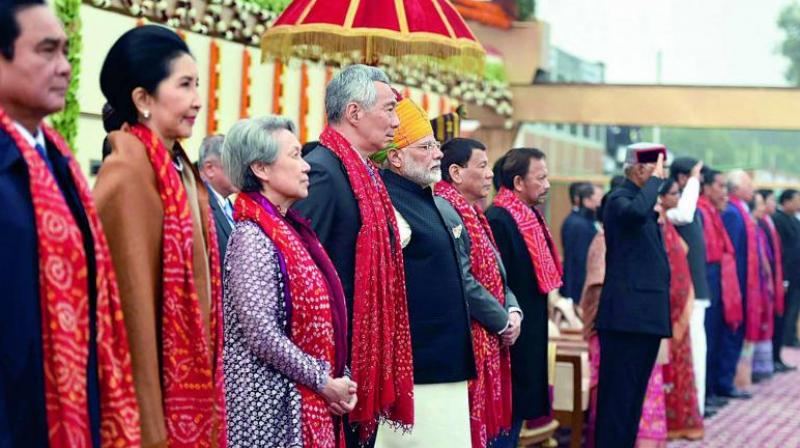Maritime security without a blueprint

India has done well to host the 25th commemorative India-Asean summit in New Delhi to indicate to the 10 Asean countries, and the bloc as a whole, how much it values its relationships with them across sectors and encompassing a wide range of political concerns.
The most important of these were flagged as the fight against extremism — on which subject New Delhi is to host a global conference — and on maritime security. The latter in recent years has come to trouble the Asean nations as well as Japan, the East Asian economic powerhouse, as well as the United States.
The reason is maritime muscle-flexing by China in order to claim practically 90 per cent of the South China Sea on account of the mineral wealth and fishing grounds these waters contain, and islands in the East China Sea it has belligerently disputed with Japan.
In addition, China has converted reefs in these waters as naval and Air Force facilities, creating anxieties among the small Asean states which can’t hope to match China’s militaristic approach and also concern in the US. But it is far from clear how far India is prepared to go in sharing burdens for maritime security in these sea lanes. Does it have the will? Does it have the resources?
Much would also depend on how far the Asean nations are ready to give the impression to China that they are keen to gang up on it in the company of India and possibly the US. After all, China, to them, is a much closer neighbour in geographical terms.
It will certainly be hard to prepare a blueprint for maritime security at this stage. Remember, India, politically, is not even ready so far to participate in joint naval patrols along with the US in the South China Sea, as it informed the Americans not long ago.
In these circumstances, it appears to have been inadvisable for Prime Minister Narendra Modi to write an Oped article, which appeared in newspapers in all the languages of all the 10 Asean nations. The language and content taunted China when it was suggested in the piece that India’s relationship with Asean was free of “contests and claims”. Was such an observation called for under the signature of the PM?
Aside from the commemorative summit itself held a day before Republic Day, New Delhi might have left many wondering as to the prudence in treating all the visiting 10 heads of government or State as R-Day chief guests.
The idea is a contradiction in terms and devalues all. It leaves the impression of crowd diplomacy of uncertain purpose, and converting a high occasion into an event management exercise. Traditionally, for 68 years, India has invited as chief guest the leader of a country with which it conspicuously wishes to flag its relationship.

